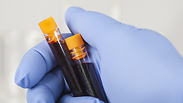
Israelis develop a blood test to diagnose lung cancer
Lung cancer is one of the most violent types of cancer, responsible for the death of 1.6 million patients each year; a first of its kind blood test, developed in Israel, succeeds in diagnosing the cancer long before it spreads in the body.
The new test is able to diagnose the disease long before it spreads in the body, thus increasing the chance of survival, as many patients usually die within a few months of the diagnosis.
Each year, approximately 1.8 million new lung cancer patients are diagnosed, a 1.59 million of whom will die within the first year post-diagnosis. Most cases are discovered by chance, after a screening test, or due to abnormal symptoms such as prolonged cough, bloody cough, breathing difficulties or weight loss.
Diagnosis of the disease is usually done via a CT scan, but its level of accuracy is not high, and in 25 percent of the cases, the lung scan shows lesions of which only 3% are indeed cancerous.
The new test was developed by Dr. Elon Ganor, CEO of Nucleix, in collaboration with his colleagues Dr. Danny Frumkin, Dr. Adam Wasserstrom and Dr. Ofer Shapira. The test is based on the genetic characterization of cancer.
Cytosine is one of the four main bases found in DNA and it is held together by three hydrogen bonds.
A study by Prof. Haim Cedar from the Hebrew University of Jerusalem found that the three hydrogen bonds molecule serves as a kind of on/off switch that activates (or deactivates) different genes and has a decisive effect on our susceptibility to cancer and other diseases. When a certain change occurs on the same molecule, a wild division of uncontrolled cells begins, resulting in the formation of cancerous tumors.
The Israeli researchers were able to isolate the specific change on that three-bonds molecule and designed a unique blood test that identifies it. To examine the efficacy of the development, two studies were conducted, involving 170 volunteers in each study: 70 were lung cancer patients and 100 were healthy, but belonged to groups at high risk for lung cancer, such as heavy smokers.
The results showed a specificity of 94% (i.e., 94% of the healthy subjects were indeed identified as healthy), and a sensitivity of 75% (i.e., 75% of the patients were indeed identified as diseased). This is a very high level of accuracy.
The researchers predict that within two years the test will be marketed to and indicated for people over the age of 50 who are considered heavy smokers (who smoke 30-pack years—i.e., one pack per day for 30 years or 2 packs per day for 15 years), or to those exposed to heavy smokers.
"This is a significant achievement after eight years of work," Dr. Elon Ganor told Ynet. "We developed the test here in Israel. We dreamed of making a significant contribution to humanity and saving lives, and we are convinced that this test will indeed save hundreds of thousands of people every year worldwide."
(Translated and edited by N. Elias)











